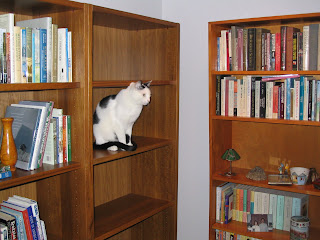Welcome to History Carnival #54It being summer, which as historians know is not a season of rest but rather a season of research trips and conferences, I'm sure many readers of the History Carnival are sitting in archives surrounded by piles of material, which they must make sense of in order to fulfill their summer writing quotas. Or at least, I'm sitting here in Virginia surrounded by a pile of material, trying to make sense of it. Sometimes, though, there is just no rhyme or reason. For History Carnival #54 I've gone through more than forty nominated posts. I couldn't use them all, but I've tried to group some posts on common themes. So here it is, in all its carnie glory, with topics ranging from mummies to poo, from murders to mayhem. Enjoy!
Just to put you in that archival mood, here's Dictatorship of the Air blogging from a
research trip to Russia.
Judith Weingarten puts the discovery (rediscovery?) of Hatshepsut
in context.
Manan Ahmed writes about outsiders in the East India Company, using the character of
William Moorcroft (veterinary surgeon, explorer, surveyor, and judge of fine horseflesh) as a way of thinking about British imperialism in the early nineteenth century. While we're on the topic of horses and vets, here's an odd case, of, er,
horse witchcraft.
Walking the Berkshires
shows off a certificate his great-grandmother received for supporting the Francis Scott Key homestead--the house was torn down in 1947. In another problem of historical memory, Clio Bluestocking focuses not on historic preservation but instead on the
historical myths surrounding the Underground Railroad. Rob MacDougall takes on similar issues in this post about the
role of amateur historians in how the public thinks about history. At Frog in a Well: China, Alan Baumler
comments on historic preservation and historical reconstruction (?) in China.
Natalie Bennett discovers the
remarkable fourteenth-century life of Margery Kempe, pilgrim, writer, and, dare I suggest, Historianess?
Greg Afinogenov discovers the e
ighteenth-century death of one Danvers Osborne, depressive, flatulent, and governor of New York for five days. But was it really suicide?
American Presidents Blog
notes the origins of the phrase "pin money" and indicates that First Ladies actually have a pin money trust fund. Who knew?
Poop the Book
presents a history of sewers. Apparently, what we have now is not optimum for the removal of human poo. Again, who knew? In case you missed it, here is Slate's
tour of London's sewers.
Aadvarchaeology quotes
Keith Windschuttle on postmodernism, receives many (some hostile) comments, and then clarifies his own position on culture. (This post is an excellent window into some hot debates in archaeology and anthropology that do affect how historians think about the history of colonized groups.)
Konrad Lawson
visits the Museum of Natural History's "Hall of Asian Peoples" and finds it wanting.
From the land Down Under, Disability Studies
has a post recognizing the 140th birthday of deaf balladeer Henry Lawson.
Also on music (and architecture), Mary Beard
comments on some operatic ironies.
Unitary Moonbat at Progressive Historians takes on another controversy with a
history of anti-immigrant walls (they just don't seem to work! yet we're building one!).
James Livingston, also at Progressive Historians, invites historiographical controversy with
this take on Abraham Lincoln.
Frumteacher comments on teaching history
through
old films at Frumteacher, and Owen Miller at Frog in a Well: Korea
comments on the rising popularity of historical fiction in Korea.
Owen Miller also has a stunning 18-part series on the 20th anniversary of the 1987 pro-democracy protests in Korea. See the whole series
here.
Historical Resources:
on ancient literature, at Trivium Pursuit;
new web resources on
being poor in Victorian England, at Victorian Peeper;
Kevin Levin of Civil War Memory
offers up a reading list on Civil War Memory. Boy, do I have some catching up to do.
Natalie Bennett
reviews the new exhibition of John White's sixteenth-century American drawings. If you have a chance to see them when they tour the US, you absolutely should. Or, you can view some online at
Virtual Jamestown.
And, some conference blogging for any other self-described conference geeks out there. Jon Dresner
guestposts at Chapati Mystery on the Asian Studies on the Pacific Coast conference.
As my concluding remark, I leave you with the Patahistorian's
LOLFoucault. That ought to leave all you carnies giggling for the rest of the day!
The next History Carnival will be held at Kevin Levin's
Civil War Memory on or around August 1.
Labels: carnivalia




